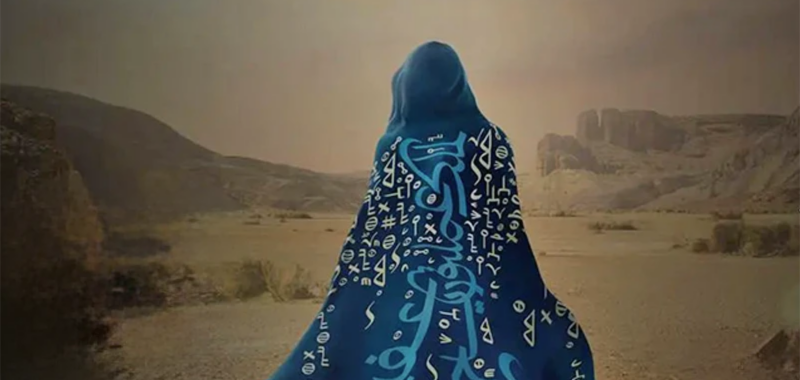Zarqa al-Yamama, (the Blue-Eyed Woman of Yamama) is a legendary pre-Islamic Arab woman, a Cassandra figure, renowned for her extraordinary intuition and her ability to perceive what others could not. Her tribe’s enemies, fearing her penetrating gaze, devised a cunning plan: they camouflaged themselves as trees. Yet, Zarqa saw through their deception when she noticed the trees moving on the horizon. She warned her people of the impending danger, but, like many seers and prophets, her visions were dismissed as madness. The enemies invaded, unleashing destruction, slaughter, and plunder. In the aftermath, Zarqa’s eyes were gouged out, and she was crucified.
In this poem, Mohamed Abdelbari masterfully weaves Arabic mythopoesis with Biblical and Quranic narratives, crafting a powerful and timeless reflection on history and the present moment. The poem garners the powers of Arabic and its sounds. It is a qasidah in the kamil meter and the ra rhyme, recalling many other resounding poems from that soundscape. I find myself thinking of the Abbasid poet Abu Tammam’s poem describing Spring, where sight and vision are triggered, challenged, and reinvented, where things are also beautifully and miraculously their opposite, where poetry exults in the power of metaphor, compared to which all forms of political and military power fall short.
Since it was first written in 2012, this poem has been received across the Arab world as an early prediction of the aftermath of the Arab Spring. Reflecting on that, Abdelbari tells me, “I found myself turning to Zarqa—as a trope, a mask, a voice—to articulate difficult thoughts and feelings in that monumental moment after the fall of regimes, especially Mubarak’s in Egypt. The dilemma before us then was how to achieve two simultaneous goals: to embrace faith in the Arab Spring while preparing for the immense consequences it would inevitably bring.” I think of Tunisia, Egypt, Libya, Sudan, Lebanon, and the mythical days we are witnessing in Syria now. Palestine is always on the mind and the reckoning Gaza demands of us, the reckoning to which it is calling our entire history.
Abdelbari’s poem takes us across the Arabic language’s wide-open expanses of poetry, narration, and myth, down its narrow corridors of diction and grammar, and up to the heights of its fruitful rivalry with the divine, rallying the language’s memory, its music, and its forms of thought. To read this poem now in the moment of genocide is to grasp at the light of poetry, no matter how hesitant and cautious, in the utter darkness of history.
–Huda Fakhreddine
*
“What Zarqaʾ al-Yamama Didn’t Say”
Something looms there beyond these heights.
I need a prophet’s tears
for sight.
Words are the diviner’s, the interpretation mine—
They quarrel: one speaks in knots which the other
unwinds.
I didn’t ask the hanging star to guide me,
nor did I sleep to chase the visions
in my mind.
Instead, I shook the ancient tree of intuition,
and grasped its waters as they vanished into
mist.
There’s no secret. The lantern of prophecy
has revealed all that would be
from what had passed.
In the coming season, Adam will eat two apples
but his sin will remain
unforgiven.
Earth will age before its time
and death will flow through us
its rivers.
The flood will rage across our homelands
for who could convince a flood
to turn back?
Chaos will set and warn all in its path:
“The Qarmatian’s sword will return
for revenge, for blood.”
Poetry will roll off the tongues of flies.
Pulpits will be taken by rabid wolves,
sacked.
Meaning will shatter upon our ruins.
Even the paths leading forward will
track back.
In the coming season, visions will clash.
The fog-tree will strike its roots in this earth,
deep.
The blind one will cast his cane aside,
don mirage-spectacles and clearly
see.
He will witness the tribe crucifying its slave,
for Azd still fears al-Shanfara’s rage,
his decree.
The blind one will see the muezzin and the imam,
both declare, “On the path to Caesar
we will be.”
In the coming season, an auction will be held,
to buy and sell the blood of the dead, far
and near.
I called out to Jacob, “This is my prophecy!
The pregnant cloud will not rain,
here.”
“Follow the map of darkness,” he replied,
“At break of light, the people will praise the path
traveled in the dark.
Do not despair; your time in the well is but one day.
Tomorrow, Prince of the Villages, the winds
will appoint you.
Shed your black, for in the city are women
who’ve cut their hands, curbing
their desire for you.
Rise and bless this arrival with a prayer.
Dedicate it to those now emerging
from the silence of soil.
Reveal to your brothers a path, may they enter,
through a thousand doors, if they wished,
the city of turmoil.
Seven bitter years are ahead. Store up
their sugar, the wisdom of their enduring
pain.
Seven lean ones will follow. Hold your breath,
and then, history will flourish green
again.
There it is, the messenger’s caravan; I see it!
Pitch your hearts’ tents, kindle your fires
bright.
I know the scent in that shirt—as always,
it shall fill my eyes with tidings
and light.”
_____________________________
From Mohamed Abadelbari’s Marthiyyat al-nār al-ʿūlā (The First Elegy of Fire)

